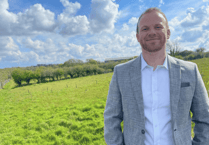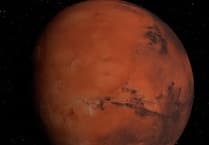IT IS apple picking season. This time of year is full of reminders of my lovely mother, who, together with my father, planned and planted our family orchard, and loved harvest time. She would have been 80 last week, so this year is a particularly poignant one.
Cornwall is full of small producers. There are organic farms that offer vegetable boxes, farm shops, farmer's markets. It's vital that we support them, as it's not easy to earn a living off the land. And what could be healthier than properly fresh produce, grown locally. If you can, try and find a supply of local apples and set some aside for storing. Late season apples always keep the best. If you have a surplus of apples, why not put them in a box in a public place for others to enjoy. Simple acts of kindness are what make a community.
We can't grow everything in this country. Some of our staples, such as coffee, tea, bananas and chocolate, can only be produced abroad. We could substitute coffee and tea for a handful of mint leaves from the garden in the summer, or sage in the winter. However I suspect this may be a step too far for most of us. In which case, we need to be mindful of the impact our overseas food has on the societies that produce it, and this is where fairtrade alliances are essential.
There is no excuse ever for not paying overseas workers a fair wage, or giving them good working conditions. And yet it is still possible to buy tea, coffee and chocolate that does not make the pledge to fairly trade. If we were to all refuse to buy products that are not ethically sourced, then the companies involved would need to reconsider their policies.
The easiest way to tell if a product is fairtrade is by the logos on the packaging. The most common are Fairtrade and Rainforest Alliance. Some supermarkets will have their own direct responsible sourcing programme, which should be detailed on the packaging. If there is no information, then the chances are that the product is not responsibly sourced.
If you are reluctant to give up a product you have a fondness for, then write to the producer asking what their policy is on fairtrade purchasing. If enough people do this, they might start to consider it a priority.
Many of our staples are associated with mass deforestation. Fairtrade or Rainforest Alliance products offer some assurance that the negative effects of cultivation are minimised. Palm oil, which is found in many processed foods, is often associated with deforestation. So is soya.
Most soya milks and soya products for human consumption are European, and of sound extraction. If you are uncertain, check the label, which should specify country of origin. However the majority of soya is grown to feed livestock and poultry, and this is where the worst of the deforestation offences occur. When food is produced in a chain in this way, influencing control over the environmental impact is much harder. For this reason it is important to reduce consumption of animal products and processed foods, in order to avoid being an unwitting contributor to the destruction of rainforests.
I would like a general ban on any overseas products that were not fairly traded, but in our neoliberal world I think this is unlikely to happen. However we can vote with our purses. And do please, in this season of harvest and fruit, support local farmers by buying local produce whenever you can.





Comments
This article has no comments yet. Be the first to leave a comment.